For decades, Incentive Compensation Management (ICM) has been the trusty sidearm of sales leaders, driving performance and propelling revenue growth. But the landscape has shifted. Today’s customer journey is a collaborative effort, and the seamless delivery of services or products is just as critical to closing the deal as the initial pitch.
Think about it. A salesperson crafts a compelling offer, secures a win, but then the delivery team fumbles the execution. Customer satisfaction plummets, future sales opportunities vanish faster than a poorly managed pipeline. This scenario underscores the critical role delivery teams play in the overall customer experience, directly impacting not just customer retention, but also upsell and cross-sell possibilities.
A strategic extension of ICM fosters a powerful synergy between sales and delivery teams. It’s not about one department trumping the other; it’s about creating a collaborative environment where everyone is incentivized to deliver peak performance, ultimately driving sustainable business growth.
How ICM Empowers Your Delivery Team
The traditional sales model often overlooks the critical role delivery teams play in securing long-term customer success. Incentive Compensation Management (ICM) can bridge this gap, transforming your delivery team from passive order-fulfillers to active revenue generators.
Here’s how ICM empowers your delivery team:
 |
Fostering Collaboration and Upselling: By incentivizing both sales and delivery teams to identify upsell and cross-sell opportunities during the delivery phase, ICM creates a collaborative environment. Delivery teams become more invested in the overall customer experience, leading to a natural increase in average deal size and win rates. |
 |
Data-Driven Efficiency and Accuracy: Modern ICM platforms leverage automation to track key performance indicators (KPIs) specific to delivery teams. These could include metrics like project manager efficiency in budget adherence and timely completion of milestones. Data-driven incentives enure everyone is focused on achieving successful project execution. |
 |
Transparency and Peak Performance: Clear incentive structures tied directly to measurable KPIs create a transparent and fair playing field for delivery teams. Team members understand exactly what they need to achieve to earn rewards, fostering a sense of ownership and accountability that motivates peak performance. |
 |
Boosting Employee Engagement: Traditionally, the spotlight of revenue generation falls solely on the sales team. Extending ICM to delivery teams acknowledges their significant contribution and boosts employee engagement. They become active participants in the revenue generation process, leading to a more motivated and results-oriented workforce. |
By aligning incentives with key performance metrics for various delivery roles (Engagement Manager, Project Manager, Solution Architect, etc.), ICM creates a powerful synergy. It’s not about individual departments competing, but about a collaborative effort where everyone is incentivized to deliver peak performance, ultimately driving sustainable business growth.
Aligning the Whole Team: The Future of ICM
The power of ICM extends far beyond the delivery team. It’s a strategic lever for creating a unified organizational culture laser-focused on performance excellence. Here’s how ICM transcends departmental boundaries:
- Beyond Delivery: Expanding the Incentive Horizon: Traditionally, ICM has been siloed within sales and delivery. But the future is about aligning incentives across the entire organization. This includes departments like HR, where successful talent acquisition and training programs directly impact overall success. Financial Planning & Analysis (FP&A) teams can also benefit from ICM by having incentives tied to achieving key metrics like financial performance and operational efficiency.
- Strategic Goals, Shared Success: By using ICM to incentivize strategic goals across departments, you break down silos and foster a collaborative environment. Imagine an HR team rewarded for talent retention initiatives that contribute to a highly skilled delivery team. Similarly, FP&A teams incentivized for cost-saving measures can directly impact profitability, a key metric for sales success. This synergy ensures everyone is working towards the same overarching objectives.
- A Culture of Performance: Extending ICM across your organization creates a powerful cultural shift. It moves away from individual departmental goals and fosters a shared accountability for organizational success. Employees across all departments become invested in driving performance excellence, leading to a more engaged and motivated workforce.
ICM is no longer just about rewarding individual achievement; it’s about aligning the entire organization towards a shared vision. By incentivizing strategic goals across departments, you unlock a new level of collaboration, efficiency, and ultimately, sustainable business success.
The Bottom Line: ICM – Your Key to Sustainable Business Success
Imagine an organization where every department is rowing in the same direction, motivated by a shared vision of success. This isn’t a utopian dream; it’s the reality unlocked by a holistic Incentive Compensation Management (ICM) approach.
Here’s how ICM propels your organization towards sustainable business success:
- A Symphony of Performance: By extending ICM beyond sales, you cultivate a culture of employee engagement. Departments like HR can be incentivized for successful talent acquisition and training programs, leading to a highly skilled workforce that drives overall performance. Financial Planning & Analysis (FP&A) teams, empowered with ICM tied to metrics like cost savings and efficiency, can directly contribute to profitability, a critical factor for sales success. This creates a symphony of performance, with each department playing a vital role in driving the organization forward.
- Operational Efficiency on Autopilot: Data-driven incentives within your ICM program become the secret weapon for achieving operational efficiency. Imagine project managers laser-focused on hitting budget targets and meeting milestones, knowing their rewards depend on it. This focus on efficiency translates to smoother project execution, happier clients, and ultimately, a stronger bottom line.
- Financial Acumen for Everyone: A well-designed ICM program fosters a culture of financial acumen across the organization. By incentivizing strategic goals like cost reduction and revenue growth, you empower employees at all levels to make decisions with financial impact in mind. This collective focus on financial health positions your organization for long-term success.
Conclusion
ICM acts as the unifying force that aligns all departments with your broader strategic objectives. It’s not just about rewarding individual achievement; it’s about creating a shared accountability for organizational success. The result? A highly motivated and engaged workforce working together to achieve remarkable things.
Ready to Unleash the Potential of Your Workforce?
Don’t wait any longer. Explore how a comprehensive ICM program can transform your organization. By incentivizing the right behaviors across all departments, you’ll unlock a new era of collaboration, efficiency, and sustainable business success. Contact Sales Drive Technologies (www.salesdrivetech.com ), a leading provider of Oracle CX solutions, Oracle SPM and Oracle ICM, to learn more! They can help you design and implement an ICM program that drives peak performance across your entire organization.




